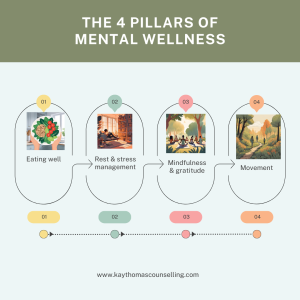Self-care – we hear it all the time, don’t we? It makes me cringe a bit, as do many of these buzzwords, but really all we’re talking about is common-sense ways to look after yourself.
This doesn’t mean drastic diet overhauls, expensive personal training, juicing, drinking litres and litres of mineral water or anything that involves an investment in kit or costs loads. It doesn’t even mean taking up lots of time. Essentially, it’s about taking the opportunity to prioritise yourself a little bit. Planning so that you factor in time in your week for work, rest and play. Thinking about your life in a balanced way.
Self-care – why should I care?
Many clients, when I suggest taking time for self-care, hear this as ‘being selfish’. This is especially true for people who see themselves as life’s carers. I often hear: ‘Oh, but I’m too busy looking after Mum, working and making sure the kids are OK. There’s just no time for me, at all!”. But self-care is important, because if you can’t look after yourself, you’re not going to be much good to those around you: a depleted person is not someone with reserves to give to others (I often use the oxygen mask analogy on a flight to illustrate this: if you are on a plane and there's an announcement to say the aircraft is losing pressure and it's time to put on your oxygen mask, the flight crew always tell you to put your own one before attending to others, on the basis that if you're unable to breathe, you're no use to anyone else).
This realisation came about after I spent two years working with clients who were struggling to cope after a bereavement at a local hospice.
During that time I saw over 150 clients who were struggling with a bereavement. Some were not eating well and living on energy drinks. Others were barely moving: stuck in their grief so they stayed indoors. Many were holding all their sadness in, waiting until nightfall to ruminate on it and worried that they'll 'bother' others if they reached out.
When I left my supervisor asked me what my biggest learning had been. Rather than coming up with something insightful relating to a grief theory or profoundly philosophical, I could honestly say that my greatest learning was this:
If you can get people to understand the importance of basic self-care and to prioritise their own wellbeing, they will find an inner resilience they didn't know they had.
The problem was, my clients very often saw their role as caring for others, but didn’t expect others to be there for them. So, by exploring these thoughts, feelings and behaviours in an accepting, non-judgemental, empathic space, we could unpick what was going on.
And, importantly, what was not going on. And that was often self-care.
The pillars of mental wellness

I often see posts about the 5 pillars of mental wellness, but I've cut it down to 4, and if I had to, I'd drill it down to the 3 Ns:
*Nourishment
*Nature (and moving outdoors)
*Nocturnal rest
If you can prioritise the food you eat, how much you move your body and spend time outside and sleep, you will find you’re much better able to cope with life’s stresses, strains and the inevitable curveballs that come our way.
Diet, exercise, community, sleep hygiene, purpose, spending time in nature, mindfulness, gratitude, rest, play, social connections… these are all things that nourish us in every sense.
